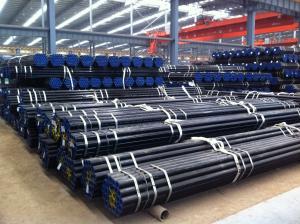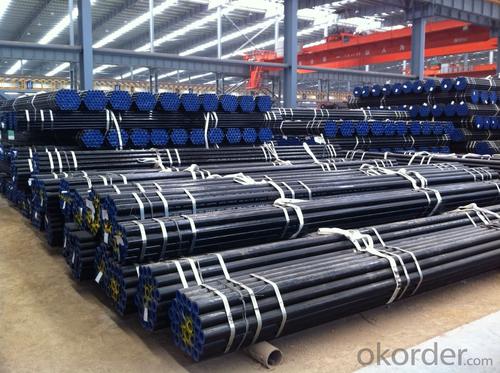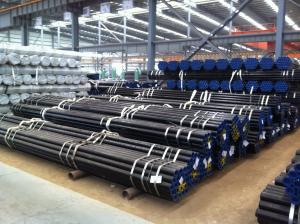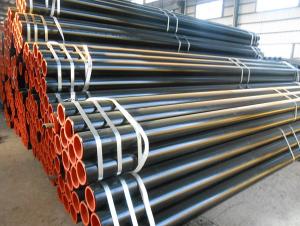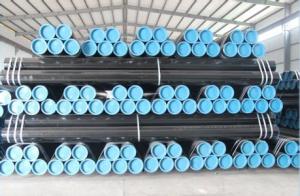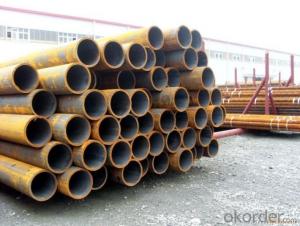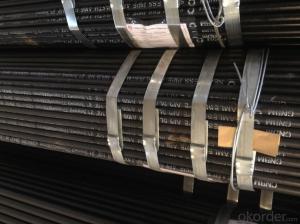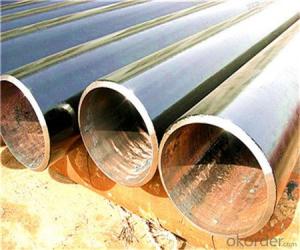API 5L Seamless Carbon Steel Pipe for 6 Inch Hot Sales
- Loading Port:
- Tianjin
- Payment Terms:
- TT OR LC
- Min Order Qty:
- 25 m.t.
- Supply Capability:
- 1000 m.t./month
OKorder Service Pledge
OKorder Financial Service
You Might Also Like
Product Description:
1、Structure of API 5L Seamless Carbon Steel Pipe for 6 Inch Hot Sales:
Seamless pipe is formed by drawing a solid billet over a piercing rod to create the hollow shell. As the manufacturing process does not include any welding, seamless pipes are perceived to be stronger and more reliable. Historically seamless pipe was regarded as withstanding pressure better than other types, and was often more easily available than welded pipe.
2、Main Features of API 5L Seamless Carbon Steel Pipe for 6 Inch Hot Sales:
• High manufacturing accuracy
• High strength
• Small inertia resistance
• Strong heat dissipation ability
• Good visual effect
• Reasonable price
3、API 5L Seamless Carbon Steel Pipe for 6 Inch Hot Sales Images:
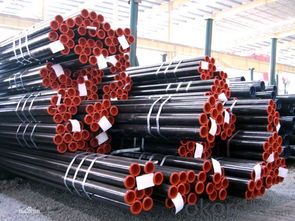
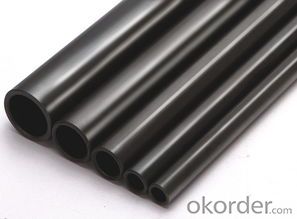
Packaging & Delivery
Packaging Details: | seaworthy package,bundles wrapped with strong steel strip |
Delivery Detail: | 15-30days after received 30%TT |
4、API 5L Seamless Carbon Steel Pipe for 6 Inch Hot Sales Specification:
Standard | GB, DIN, ASTM |
Grade | 10#-45#, 16Mn |
Thickness | 8 - 33 mm |
Section Shape | Round |
Outer Diameter | 133 - 219 mm |
Place of Origin | Shandong, China (Mainland) |
Secondary Or Not | Non-secondary |
Application | Hydraulic Pipe |
Technique | Cold Drawn |
Certification | API |
Surface Treatment | factory state or painted black |
Special Pipe | API Pipe |
Alloy Or Not | Non-alloy |
Length | 5-12M |
Outer Diameter | 21.3-610mm |
Grade | 20#, 45#, Q345, API J55, API K55, API L80, API N80, API P110, A53B |
Standard | ASME, ASTM |
1.Material:20#(ASTM A 106/A53 GRB.API5LGRB,GB),45#,16Mn,10#.
2.Specification range:OD:21.3-610mm,WT:6-70mm,length:6-12m or according to the requirement of clients.
3.Excutive standards:GB,ASME API5L.ASTM A 106/A53,Despite of the above standards,we can also supply seamless steel pipe with standard of DIN,JIS,and so on,and also develop new products according to the requirements of our clients!
4.Surface:black lacquered,varnish coating or galvanized.
5.Ends:Beveled or square cut,plastic capped,painted.
6.Packing:bundles wrapped with strong steel strip,seaworthy packing.
5、FAQ ofAPI 5L Seamless Carbon Steel Pipe for 6 Inch Hot Sales:
①How is the quality of your products?
Our products are manufactured strictly according to national and internaional standard, and we take a test
on every pipe before delivered out. If you want see our quality certifications and all kinds of testing report, please just ask us for it.
Guaranteed: If products’ quality don’t accord to discription as we give or the promise before you place order, we promise 100% refund.
②How about price?
Yes, we are factory and be able to give you lowest price below market one, and we have a policy that “ for saving time and absolutely honest business attitude, we quote as lowest as possible for any customer, and discount can be given according to quantity”,if you like bargain and factory price is not low enough as you think, just don’t waste your time.Please trust the quotation we would give you, it is professional one.
③Why should you chose us?
Chose happens because of quality, then price, We can give you both.Additionally, we can also offer professional products inquiry, products knowledge train(for agents), smooth goods delivery, exellent customer solution proposals.Our service formula: good quality+good price+good service=customer’s trust
SGS test is available, customer inspection before shipping is welcome, third party inspection is no problem.
Any question, pls feel free to contact us !
- Q: What is the role of steel pipes in the mining and extraction of minerals?
- Steel pipes play a crucial role in the mining and extraction of minerals. They are widely used in various mining operations to transport water, slurry, and other fluids, as well as to provide structural support and ventilation in underground mines. One of the primary uses of steel pipes in mining is for transporting water or slurry. Water is essential in the mining process for various purposes, such as dust suppression, ore processing, and site rehabilitation. Steel pipes are used to create a network of pipelines that transport water from a source, such as a dam or reservoir, to different areas within the mine site. Similarly, slurry, a mixture of water and crushed minerals, is often transported through steel pipes to processing plants or tailings dams. Steel pipes also play a critical role in providing structural support in underground mines. Underground mining operations require tunnels and shafts to access valuable mineral deposits. These tunnels and shafts need to be reinforced to withstand the immense pressure exerted by the surrounding rock and prevent collapses. Steel pipes are used as support structures, such as roof bolts and rock bolts, to reinforce the walls and roofs of these underground excavations, ensuring the safety of miners and the stability of the mine structure. Additionally, steel pipes are used for ventilation systems in underground mines. Proper ventilation is vital in mining to ensure a constant supply of fresh air, remove harmful gases, and control temperature and humidity levels. Steel pipes are used to create ventilation shafts and ducts that facilitate the flow of air throughout the mine. This helps maintain a safe and healthy working environment for miners by preventing the buildup of toxic gases, dust, and heat. In summary, steel pipes are indispensable in the mining and extraction of minerals. They are used for transporting water, slurry, and other fluids, providing structural support in underground mines, and facilitating ventilation systems. Without steel pipes, the efficient and safe extraction of minerals from mines would be significantly hindered.
- Q: How are steel pipes used in the manufacturing of shipbuilding and offshore structures?
- Steel pipes are widely used in the manufacturing of shipbuilding and offshore structures due to their high strength and durability. These pipes are used for various purposes such as constructing the hull of the ship, creating structural supports and framework, and facilitating the transportation of fluids and gases. Their corrosion-resistant properties and ability to withstand extreme conditions make steel pipes an ideal choice for these applications.
- Q: SC15 what does galvanized steel pipe look like?
- Zinc plating: galvanized steel pipe hot galvanized and galvanized two kinds, hot galvanized, zinc coating thickness, with uniform coating, adhesion, long service life and so on. The cost of galvanizing is low, the surface is not very smooth, and the corrosion resistance of itself is much better than that of galvanized pipe. Refer to
- Q: What is the compressive strength of steel pipes?
- The compressive strength of steel pipes can vary depending on the specific grade and manufacturing process, but it is generally high. On average, steel pipes have a compressive strength ranging from 60,000 to 120,000 pounds per square inch (psi).
- Q: Can steel pipes be used in extreme weather conditions?
- Yes, steel pipes can be used in extreme weather conditions. Steel is known for its high strength and durability, making it suitable for a wide range of applications including construction, infrastructure, and transportation. Steel pipes are commonly used to transport fluids and gases in various industries, and they are designed to withstand harsh environmental conditions, including extreme temperatures, high pressures, and corrosive environments. In extreme weather conditions such as extreme heat, cold, or heavy rain, steel pipes can maintain their structural integrity and functionality. Additionally, steel pipes can be coated or insulated to provide additional protection against corrosion and to maintain desired temperatures. Overall, steel pipes are a reliable choice for use in extreme weather conditions due to their strength, durability, and resistance to various environmental factors.
- Q: What are the factors to consider when selecting steel pipes for a specific application?
- When selecting steel pipes for a specific application, several factors need to be considered. The key factors include the required strength and durability, corrosion resistance, temperature and pressure requirements, size and dimensions, cost considerations, and compatibility with other materials or systems. Additionally, factors such as the intended environment, installation requirements, and regulatory compliance should also be taken into account to ensure the optimal selection of steel pipes for the particular application.
- Q: What are the different types of steel pipe flanges?
- There are several types of steel pipe flanges, including slip-on flanges, weld neck flanges, socket weld flanges, threaded flanges, lap joint flanges, and blind flanges. Each type has its own unique design and application, catering to various piping systems and requirements.
- Q: What are the common standards for coating and lining of steel pipes?
- The common standards for coating and lining of steel pipes are outlined by various organizations and regulatory bodies to ensure the durability, corrosion resistance, and overall quality of the pipes. Some of the widely recognized and used standards include: 1. American Society for Testing and Materials (ASTM): ASTM has developed numerous standards for coating and lining of steel pipes, such as ASTM A775/A775M for epoxy-coated reinforcing steel, ASTM A1064/A1064M for metallic-coated steel wire, and ASTM A1057/A1057M for fusion-bonded epoxy-coated steel reinforcement. 2. American Water Works Association (AWWA): AWWA has established several standards for coating and lining of steel pipes used in the water industry. Examples include AWWA C210 for liquid epoxy coating systems for the interior and exterior of steel water pipelines, and AWWA C213 for fusion-bonded epoxy coating for the interior and exterior of steel water pipelines. 3. National Association of Corrosion Engineers (NACE): NACE International develops standards and recommended practices for the corrosion control of steel pipes. NACE SP0169 provides guidelines for selection and application of coatings for underground or submerged steel pipelines, while NACE SP0198 offers recommendations for external coatings of steel pipelines. 4. ISO Standards: The International Organization for Standardization (ISO) has developed various standards related to coating and lining of steel pipes. ISO 21809-1 specifies the requirements for external coatings applied to buried or submerged pipelines, while ISO 21809-2 focuses on the internal coating and lining of such pipelines. These standards cover different aspects of the coating and lining process, including surface preparation, application methods, minimum coating thickness, adhesion, and quality control. Adhering to these standards ensures that steel pipes are properly protected against corrosion, abrasion, and other forms of deterioration, leading to longer service life and enhanced performance in various industries such as oil and gas, water supply, and infrastructure.
- Q: What are the different types of gaskets used with steel pipes?
- There are several types of gaskets commonly used with steel pipes, including spiral wound, ring joint, and flat gaskets. Spiral wound gaskets are made by winding a metal strip and a filler material together, providing excellent sealing properties. Ring joint gaskets are typically used in high-pressure applications and have a metallic ring shape to ensure a tight seal. Flat gaskets, on the other hand, are simple, flat pieces of material, often made from rubber or graphite, and are used for low-pressure applications.
- Q: How to make the steel pipe spray paint is not easy to fall off?
- First you will rust steel, to clean, good quality alkyd rustproof paint, completely dry after brushing paint, color to see his kind of love.
Send your message to us
API 5L Seamless Carbon Steel Pipe for 6 Inch Hot Sales
- Loading Port:
- Tianjin
- Payment Terms:
- TT OR LC
- Min Order Qty:
- 25 m.t.
- Supply Capability:
- 1000 m.t./month
OKorder Service Pledge
OKorder Financial Service
Similar products
Hot products
Hot Searches
Related keywords
